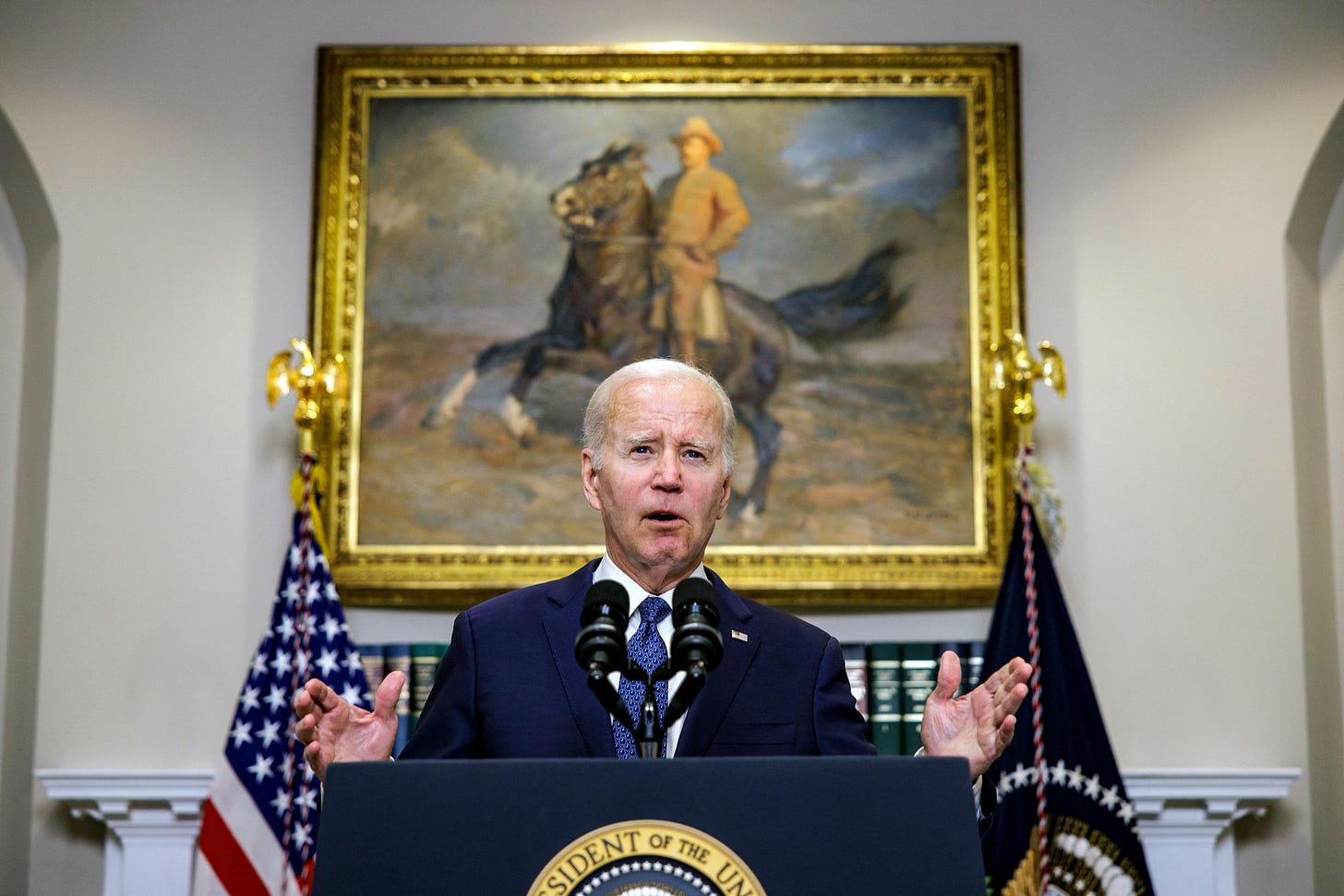TL(PM) DIGEST: No way to run a circus
Plus China's economy hits the wall, Saudi-Russian tensions on oil production, and Republican presidential hopefuls running up that hill against Trump

1. President Biden and Speaker McCarthy do the right—if convoluted and unnecessary—thing for the economy and the country
What happened? The White House and congressional negotiators reached a tentative deal to raise the debt ceiling for two years—and avoid national default—in exchange for a variety of spending caps mostly to domestic programs along with new work requirements for nutrition assistance.
Why does it matter? The House of Representatives has been pressing the nation’s luck for months now, trying to leverage the threat of national default for a variety of hard right policy goals. President Biden initially refused to engage with this approach, but wisely saw the writing on the wall and found an agreement that minimizes the damage while protecting the nation’s credit worthiness—assuming the so-called “Freedom Caucus” and extremist members of Congress don’t tank the whole deal this week.
TLP’s take: As we approach the end of the debt ceiling standoff, it’s clear that it was a pointless circus that only undermined trust in the U.S. political system around the world—and in our own country. Having the threat of default off the table through the presidential election will be a relief, but ultimately the U.S. needs to eliminate the debt ceiling altogether and remove the possibility that Congress passes legislation it later refuses to pay unless ransom demands are met.
This is no way to run the world’s largest economy.
2. China’s economy slows way down
What happened? After a brief spurt of growth following the end of Beijing’s “zero COVID” policies earlier this year, China’s economy appears to be slowing down—perhaps permanently. As the Financial Times reports:
Industrial production and profits, property sales and credit growth have all fallen short of analysts’ projections in April and early May, recent data showed, sapping confidence in the growth prospects for the world’s second-largest economy.
The slowing momentum has already dented markets, with the price of commodities such as copper and iron ore falling, stocks down and the renminbi weakening to more than seven to the dollar. Consumer spending, which initially jumped after the Covid-19 controls were eased at the beginning of the year, has also fallen back on a gloomy economic outlook.
Why does it matter? As the Wall Street Journal notes:
Instead of expanding at 6% to 8% a year as was common in the past, China might soon be heading toward growth of 2% or 3%, some economists say…
China could drive less global growth this year and beyond than many business leaders expected, making the country less important for some foreign companies, and less likely to significantly surpass the U.S. as the world’s biggest economy.
TLP’s take: As Rep. Ritchie Torres (D-NY) argued in his recent TLP interview, China’s economy has a number of shortcomings and weaknesses—and we’re only just starting to see some of them become apparent. But that doesn’t mean America should let up on its own industrial policies or go soft on Beijing any time soon, since it still poses a severe geopolitical and economic challenge to industrial democracies around the world.
3. Tensions between Saudi Arabia and Russia on oil production
What happened? The Wall Street Journal reports on emerging tensions between Saudi Arabia and Russia over oil production. Moscow has continued to pump oil into global markets in order to fund its war against Ukraine at the same time Riyadh has attempted to organize production cuts to keep oil prices up.
Why does it matter? Saudi and Russian interests are clearly not aligned when it comes to oil production: Riyadh wants to control production to maintain oil prices at or above its break-even level of $81 per barrel to remake its economy and fund ambitious “gigaprojects,” while Moscow needs to take whatever cash it can get for its own oil to fund its aggression against Ukraine. Russia has become the top supplier of oil to China and India as well, knocking Saudi Arabia from first place in both growing markets.
TLP’s take: Saudi officials should know where their interests still lie—and they’re not with Beijing or especially Moscow. Whatever deep differences or severe problems we may have with each other, Saudi Arabia and the United States remain strategic partners for good reasons, energy security among them. It’s best not to forget why.
4. Republican presidential contenders have their work cut out for them to overcome Trump
What happened? Recent polling averages from RealClearPolitics show that former president Trump has widened his lead in the Republican presidential nomination race even as more candidates have entered the contest over the past few months.
Why does it matter? At the end of March, Trump was polling around 46 percent on average with undeclared candidate Gov. Ron DeSantis (R-FL) in second with 30 percent. Since then, Trump’s lead has grown to a high of 56 percent and now sits around 53 percent on average—and Gov. DeSantis’s less-than-optimal opening act last week probably won’t help him much in his steep climb to overtake Trump.
TLP’s take: The challenge for all of Trump’s opponents remains the same as it was in 2016: How exactly do you cut into Trump’s iron grip on working-class Republican voters while solidifying the largest share of college-educated, anti-Trump voters? No one seems to have figured out how to do this and until they do, the Trump train rolls on.
Just one more thing…
El Niño is coming for your morning coffee: the recurring global weather pattern may heavily disrupt growing conditions in coffee-growing parts of the world this year, leading to lower yields and reduced quality—and possibly higher prices.







